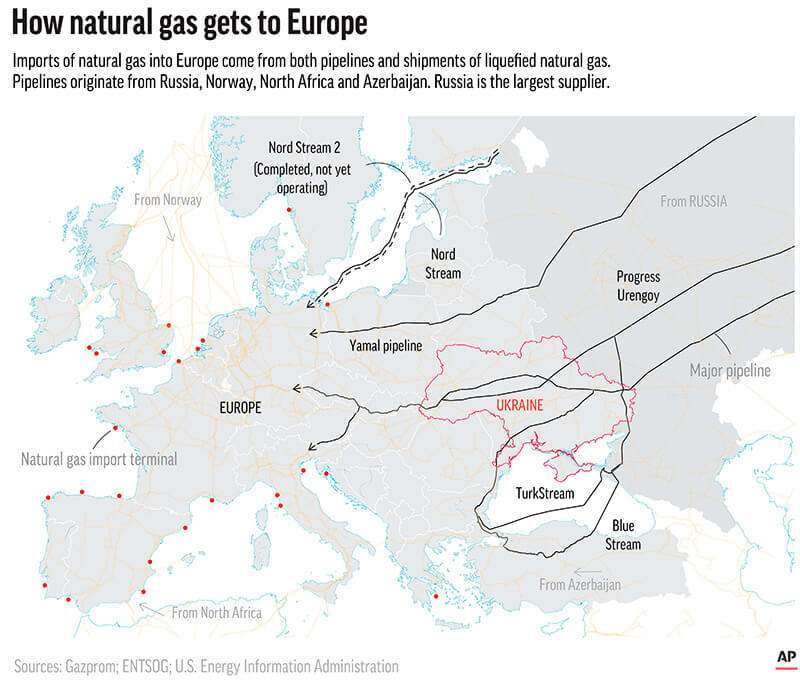Ukraine halts part of the transit of Russian natural gas

Ukraine has suspended the transit of Russian natural gas through a route that provides about a third of the Kremlin's shipments through the country to Europe. This was announced on 10 May in a statement by GTSOU, the Ukrainian state company that controls the country's gas pipeline system, which reported that it would close the Sokhranovka route on 11 May at 7 a.m. Ukrainian time.
The latter, which is part of the Soyuz pipeline, enters Ukraine from Lugansk oblast on its way to Europe, and accounts for about a third of total Russian shipments through the country, up to 32.6 million cubic centimetres per day.
Ukrainian drone-dropped munition strike on a Russian tank (claimed to be a T-90 MBT) somewhere in southern Ukraine.#Russia #Ukraine pic.twitter.com/y56IzceBWc
— BlueSauron?️ (@Blue_Sauron) May 11, 2022
GTSOU cited "force majeure" due to its inability to operate the Novopskov comprehension station near the Russian border, which was occupied by Moscow and separatist Lugansk militias in the first days of the invasion.

In the statement, GTSOU proposed as an alternative the use of the Sudzha route, another key point entering through the government-controlled Sumy oblast into the Brotherhood pipeline.
So far, at no time since 2014, neither during the Dombash war against pro-Russian separatists nor during the invasion that began on 24 February, had supplies been stopped. GTSOU had stated on 27 February that Kiev would not use energy as a weapon, as "we have no interest in using our position as a gas transit corridor to put pressure on Europe".
The footage shows a gas pipeline on fire in Kharkiv after a Russian attack.
— The Kyiv Independent (@KyivIndependent) February 27, 2022
Video: State Special Communications Service of Ukraine pic.twitter.com/owuSoKqoFA
Gazprom, Russia's main state-owned gas company, responded to the statement that it would be "technologically impossible" to transport supplies from Sokhranovka to Sudzha, although, according to GTSOU, the maximum capacity of this route would allow for a significant increase in shipments. Gazprom also denied that there was a "force majeure", claiming, therefore, that there would be no obstacle to maintaining gas transit.

The European market responded to the announcement with an increase in prices from 93 euros per MWh to over 100, according to Dutch TTF Natural Gas price futures, one of the main indicators. However, in the last few hours, prices have fallen back to levels similar to pre-announcement values.
Orders for Russian natural gas from Europe reportedly fell by 25% on 11 May due to the impossibility of using the Sokhranovka route, according to Gazprom.
Ukraine is a key route for Russian natural gas exports to Europe, with some of the main pipelines linking Moscow to the rest of the continent, a legacy from the Soviet era.

Although Russia has tried to reduce transport through Ukraine with the construction of new pipelines, including Nord Stream I and II and Turkish Stream, its neighbour still represents the main transit route.
Since the fall of the Soviet Union, natural gas has been an area of tension between Russia and Ukraine, with the Kremlin halting supplies twice in 2006 and 2009 over price disputes, but it has also been one of the most lucrative sectors of the Ukrainian economy, thanks to the rights of passage that Kiev obtains in this operation.

This announcement comes on top of Gazprom's blocking of supplies to Poland and Bulgaria for refusing to comply with Russian demands to pay for natural gas in roubles, threatening a disruption in the European market.
It also comes against the backdrop of the EU's attempted reduction of Russian natural gas purchases, which account for up to 40 per cent of its total imports and are one of Moscow's main sources of revenue. European Commission President Ursula Von der Leyen has already announced her readiness to push ahead with a plan to reduce Russian gas imports by up to two-thirds by the end of 2022 and a total blockade by 2027.








